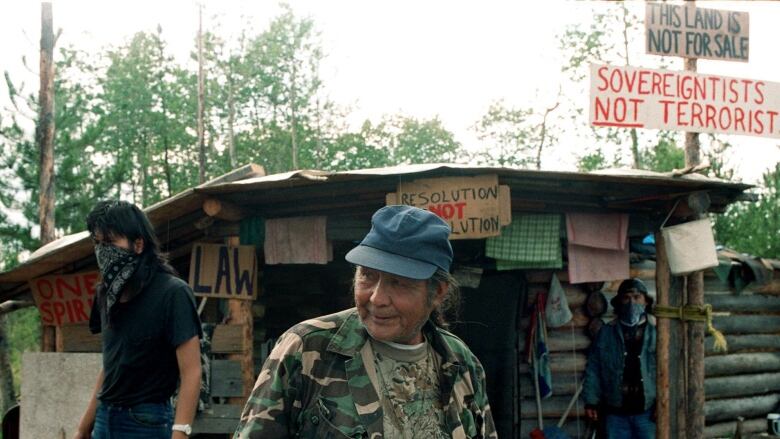Indigenous leaders hope new required high school courses in B.C. will help combat racism
Secondary students will have to study Indigenous issues to graduate starting in 2023

Some Indigenous leaders in British Columbiasay the provincial government's move to mandateIndigenous learningfor secondary students is a step on the pathtotruth and reconciliation.
Grand Chief Stewart Phillip, president of the Union of B.C. Indian Chiefs, says he found the news "encouraging"and says students have a fundamental right tounderstand thehistory of the lands they live on.
He says learning Indigenous history, in a truthful and objective way, will help combat racism.
"Ouronly hope topurge this country ofbad, ugly, racist notions is ... through the public education system," he said.
The province announced March4 all secondary school students in B.C. will be required to complete Indigenous-focused coursesbefore graduation.The change will take place in the 2023-2024 school year.
The Ministry of Education said in a statement the graduation requirement is intended to help students gain broader knowledgeof Indigenous Peoples' perspectives, histories and cultures.
Chance to build empathy, advocate says
Tyrone McNeil, president of the First Nations Education Steering Committee (FNESC), is part of the team working with the province to build the curriculum.
FNESCisan advocacy organization that works on behalf of B.C. First Nations. Its mandate is to support Indigenous students and advance First Nations education in the province.
McNeilagrees that requiring thesecourseswill reduce bias and racism over time not only within the student population, but among teachers and educators as well.
"This is an opportunity to continue building opportunities for that empathy, for that compassion, for a bit of a better understanding aboutwho we areand some of what we've gone through," he said.
What the coursescould look like
The ministrysaid it's still working out a plan to implement this curriculum and launched anonline public engagement surveyto seek feedback from parents and students.
Staff will also engage with Indigenous communities andteachersthroughout March and April to figure out the best way to move forward.
The province has proposed students will need to complete four credits through new and existing Indigenous-focused courses such as B.C. First Peoples 12, Contemporary Indigenous Studies 12 and several First Nations language courses. Previously, these courses were optional.
According to an outlineprovided on the ministry's website,B.C. First Peoples 12 covers topics such astraditional territories of the B.C. First Nations and relationships with the land, role of oral traditions, and the past and current impacts of colonialism.
Contemporary Indigenous Studies 12 focuses onvaried identities and world views of Indigenous peoples,community development, partnerships, control of economic opportunities, and restoring balance through truth, healing, and reconciliation in Canada and around the world.
After the engagement process wraps up this spring, the province will work with theFirst Nations Education Steering Committee and teachersto identify whether current courses need updating.While the proposed model doesn't make room for creating additional provincial courses, it does allow for the creation of new courses at the district level. The ministry said local school boards will be expected to work with their local First Nations to help develop the course.

McNeil, who is from theSt:lNation in the Fraser Valley,hopes school districts and teachers will want to create specialized courses at the district level.
"Thisis an opportunity to have a little bit more of our individual identity shared across the system," he said.
Phillipsaid he hopes there's more of a focus on the critical role Indigenous people played in the formation of B.C. and the contributions they've made throughout the province's history.
B.C.is the first province or jurisdiction in Canada to implement this type of education requirement, said the ministry.












_(720p).jpg)


 OFFICIAL HD MUSIC VIDEO.jpg)
.jpg)



























































































